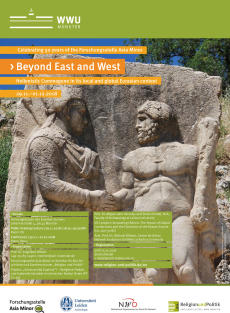“Beyond East and West”
International Conference of the Cluster of Excellence on Hellenistic Commagene

Hellenistic Commagene is the subject of an international conference of the Asia Minor Research Centre and the Cluster of Excellence “Religion and Politics” of Münster University from 29 November until 1 December 2018. The history and archaeology of Hellenistic Commagene forms a rich field of study, not in the least because of the remarkable monuments and inscriptions of king Antiochos I (who ruled between c. 70 and 36 BC) that could be said to dominate the Commagenean landscape and its archaeology until the present day.
The last decade has seen the publication of many important new books and articles on Hellenistic Commagene while fieldwork in the region continues to produce novel insights as well. From all this work a different picture of Hellenistic Commagene now seems to emerge; a picture in which Hellenistic Commagene it is no longer understood as peripheral and out-of-the-ordinary, as earlier scholarship tended to do, but rather as a central node in a global Hellenistic network - and in many regards exemplary of socio-cultural developments in the wider Hellenistic world.
Building on this exciting development, the conference aims at a critical evaluation of all these new ideas and simultaneously works towards a novel and state-of-the-art overview for the history and archaeology of Hellenistic Commagene, integrating various Anglo and Continental research traditions in Hellenistic archaeology and history with that. Day 1 will be devoted to the history and archaeology of Commagene proper; Day 2 will try and place Commagene in its wider Hellenistic context by presenting a wide variety of comparable case-studies.
Led by Engelbert Winter, and supported by the German Research Foundation (DFG), the international team of the Asia Minor Research Centre comprising archaeologists, historians, architectural historians, restorers, archaeozoologists and anthropologists, has been digging in Doliche since 2001. It has already uncovered, for example, the strong foundations of the first Iron Age sanctuary of the god of Doliche, architectural fragments from monuments of the main Roman temple of Jupiter Dolichenus, as well as the sprawling ruins of a major Byzantine monastery built on this site by followers of the Christian faith following the demise of the ancient sanctuary. (exc/sca)

